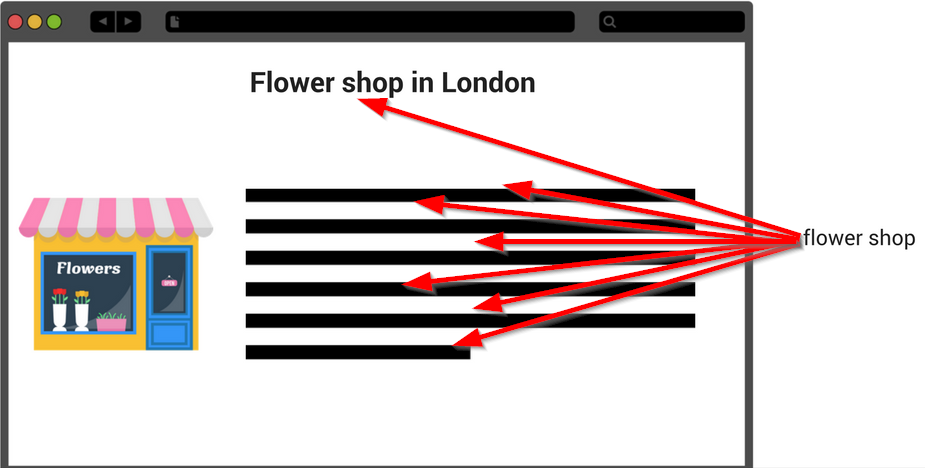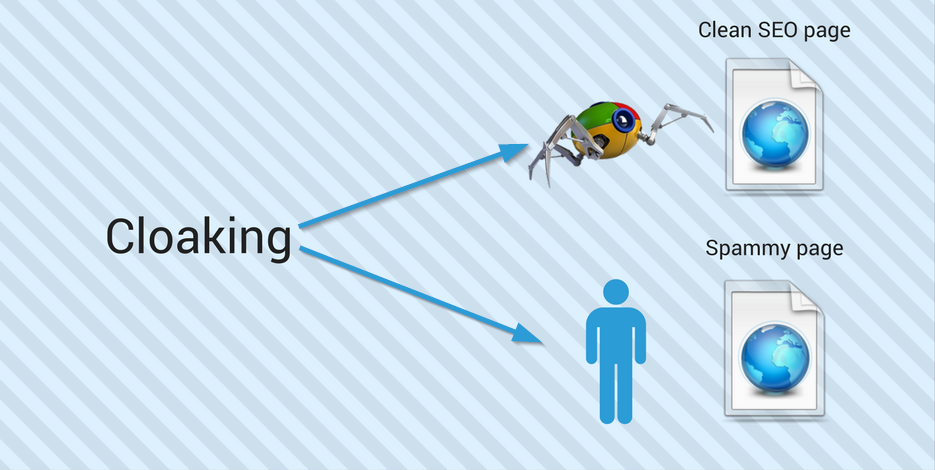10 Black Hat SEO Techniques to Kill Your Search Engine Visibility

But a huge proportion of the masses still haven't been able to let go of those old tips and tweaks, which not only are useless, but also have a negative effect on their projects, fatal in many cases.
So here are the top 10 black hat techniques which most likely to guarantee your failure.
What are blackhat techniques?
What are blackhat techniques?
In other words, any technique which doesn't follow the natural course of actions and which goal is to push your site up the ladder (in an aggressive manner) is a blackhat technique.
The crucial point to note here is that Google doesn't have an official list which clearly states which are black hat techniques, and which aren't. But it does announce and publish "What it prefers" kind of blog posts from time to time via interviews, press-releases and stuff, so anything against those preferences is likely to be a black-hat technique.
Top 10 most common, and penalty-welcoming black hat techniques
Top 10 most common, and penalty-welcoming black hat techniques
#1:
Keyword Stuffing
Keyword Stuffing
But then Google got smarter and since late 2012, Google actively started recognizing keyword-stuffed pages and as a result penalizing them.
Here's an example of how keyword stuffed page looks like:

The best solution to insert your keywords while not triggering an alert is to use LSIs. They basically are keywords with the same meaning as your primary keyword, but don't necessarily spell the same.
For e.g. "Best SEO agency" can also be referred to as "#1 SEO company" "Best SEO service" etc. Place these LSIs around your page instead of using the same one several times.
Check his video to learn more about LSI keywords and where to find them:
#2:
Cloaking
#2:
Cloaking
It was used to rank for certain keywords by showing clean SEO pages to Google bots, while in reality when a human users landed on the site, they were bombarded with images, flash installers and other spammy stuff.
SEO specialists also use this technique to fool search engine bot as to the number of pages the website has. The website shows thousands of pages to search engine bots, while users see the website with several pages with worthless content in the most cases .
Here's an illustration of what cloaking looks like:

#3:
Private Blog Networks
#3:
Private Blog Networks
This technique is quite popular nowadays as even if these blogs are penalized, the primary site remains safe. It's a strategy that hasn't been actively detected by Google yet.
I recommend you to think about the future and be careful in using this technique as sooner or later Google will learn how to detect this and your primary site may be affected.
#4:
Web 2.0s
#4:
Web 2.0s
They again aren't content or quality rich, but are used as it's slightly higher to boost the domain authority and other metrics for such web2.0 properties. As far as Google is concerned, any link which has been made manually to boost ranking is an unnatural link. So obviously Google doesn't trust web2.0s.
#5:
Buying lots of irrelevant links
#5:
Buying lots of irrelevant links
Note that even if you check backlinks and get a bunch of them from the relevant sites, you can also be penalized, because Google knows that no one gets organic links that fast.
So, making a lot of links isn't the best approach, in fact, it's one of the worst as they're instantly detected by Google unlike some other black-hat techniques on this list.
The solution? You need to get relevant, quality links, at a reasonable time-gap.
The easiest trap many fall prey to is buying backlinks. You can literally buy thousands of backlinks using $5-25 fiverr gigs, or create them using automated tools like GSA. The thing is, those links are totally random, and are extremely harmful to your site. So that's another one of those techniques you need to distance from.
#6:
ClickBaiting
#6:
ClickBaiting
It's the practice of using misleading images, falsified data, and catchy headlines which are there only to grab the attention of the readers, without really being true or legit.
Here's an example:

And recently, Google and Facebook both took steps against clickbaiting. Currently, it's widely used, and isn't on the direct radar of Google, but I'm more than certain that in the (very) near future, it will be.
And when it is, your site will be done for good, so if you're currently using clickbaits, it's about time you go legit.
#7:
Domain redirection
#7:
Domain redirection
So once the domain is acquired, it is permanently redirected to your primary site, and thus all it get all the authority and juice. Considering how 301 redirection in itself is legal, it's a tad-bit harder for Google to penalize all the sites redirecting to other sites.
But then again, it's not a practice you should be indulged in, cause sooner or later Google will figure it out (it figures everything out) and then your years of hard work go down the drain.
#8:
Page Switching
#8:
Page Switching
And then, once the page is ranked, they change the content to something of commercial value. Basically, the user totally gets mislead and doesn't get his problem solved.
Now, the primary goal of search engines is to "help users land on the most appropriate, useful links". So if your link is in exact contrast to that agenda, and you're caught, best case you're penalized, worst case you're banned for good.
#9:
Spun Content
#9:
Spun Content
Spun content is basically the same content, with most of the words being replaced by their synonyms. So what happens is, the content remains the same, but it doesn't trigger a duplicate content alert because the sentences aren't exactly the same.
Here's an example:

#10:
Duplicate Content
#10:
Duplicate Content
The reason it's being mentioned here is that it's still a prevalent technique, and a large number of people still do use it.
Bottom line? Do not, I repeat to not copy-paste content. Create unique and high-quality content.
Summing up
Summing up
But Google is getting smarter by the day, so no matter what your technique is, Google will find it out. So all I can say is, if you're thinking long-term, distance yourself as far away from the above-mentioned techniques as possible.
Speed up your search marketing growth with Serpstat!
Keyword and backlink opportunities, competitors' online strategy, daily rankings and SEO-related issues.
A pack of tools for reducing your time on SEO tasks.
Discover More SEO Tools
Backlink Cheсker
Backlinks checking for any site. Increase the power of your backlink profile
API for SEO
Search big data and get results using SEO API
Competitor Website Analytics
Complete analysis of competitors' websites for SEO and PPC
Keyword Rank Checker
Google Keyword Rankings Checker - gain valuable insights into your website's search engine rankings
Cases, life hacks, researches, and useful articles
Don’t you have time to follow the news? No worries! Our editor will choose articles that will definitely help you with your work. Join our cozy community :)
By clicking the button, you agree to our privacy policy.

